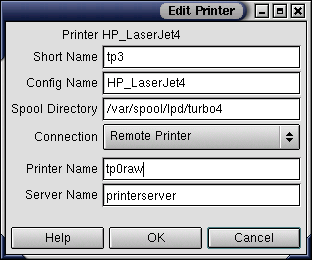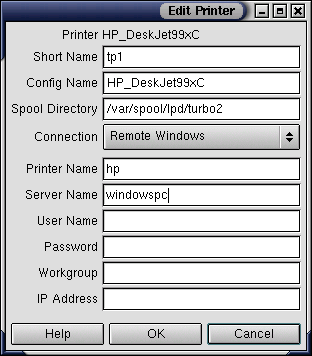
Printers that were set up on a printer server under CUPS are visible on all clients, if "browsing" was activated on server and clients. If browsing is not yet enabled you have to edit the file
/etc/cups/cupsd.conf
and add or uncomment the line
Browsing On
If the TurboPrint driver is installed only on the client, choose in xtpsetup "connection" = "IPP", enter the IP address or server name in the field "Server Name" and in the field "Printer Name" use
printers/printername
(replace printername by the real name of the printer queue
on the server).
If you use TurboPrint, the conversion from the document or image format (e.g. Postscript, PPM, ...) to the printer command language (e.g. ESC/P or PCL) will always be done on the local workstation (where the "lpr" command has been issued).
This means that on the printer server, a printer queue without any further conversion or "filtering" must exist. If TurboPrint is used to create printer queues on the printer server, it will automatically create such "raw printer queues" for access from client computers. These are named like the normal printer queues plus the ending "raw". For example, if the short name of a TurboPrint configuration is called "tp0", the raw printer queue is named "tp0raw".
This raw printer queue must be chosen in xtpsetup on the client computer.
Example for the configuration of a network printer in xtpsetup (the printer server is named "printerserver", the raw printer queue on the server is "tp0raw"):

In xtpsetup choose connection type "Remote Printer", enter the IP address of the server box under "Server Name" and enter "lp0" for "Printer Name" (or "lp1", "lp2" etc. for additional printer ports on the same server).
If the printer server is a windows computer accessed via SAMBA, it will always interpret the data as "raw". Example for the configuration of a windows network printer in xtpsetup (the printer server is named "windowspc", the printer on the server has been shared using the name "hp":

If you want to share a printer that is connected to your Linux workstation to a windows computer, the SAMBA package must be installed and running. In the SAMBA configuration file, the printer queue must be made accessible for access from the network.
Which printer driver should be chosen on the windows computer? There are two general possibilities:
If the CUPS printing system is installed on your Linux computer print jobs that come from a Windows computer are by default sent to the printer without changes.
It that doesn't work on your installation, you have to edit the configuration file
/etc/smb.conf
on your Linux computer. In the section for the printer the line
print command = lpr -l -r -P%d %s
must be added (or modified, if the entry "print command" already exists). Thus print commands from Windows will be interpreted as "raw".
/etc/smb.conf
print command = lpr -r -P%d %s